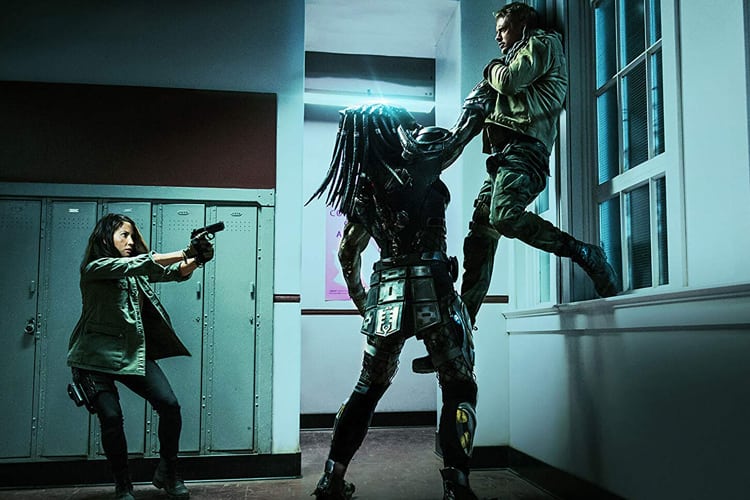The latest reboot to hit theaters is “The Predator”, the third sequel to the classic “Predator”. Thank goodness for the definite article: how could we possibly tell the difference between the ‘80s blockbuster starring Arnold Schwarzenegger and its modern reboot if they had the same name? Is there any good reason that this sequel exists? Will the age of reboots last much longer? Well, not if climate change carries on unabated—which, believe it or not, is a plot point in “The Predator”.
That should be your first tip that this reboot is a different beast than the original. Writer/director Shane Black should know that better than anyone: he was an actor in 1987’s “Predator”, a silly horror/sci-fi/action mashup about aliens mashing humans up. Rather than relive the tone of his past work, Black drops the horror and goes heavy on the silly with “The Predator”.
When the silliness works, “The Predator” works. Shane Black is no stranger to comedy: his debut feature as a director was the madcap indie “Kiss Kiss Bang Bang”, and his 2016 effort “The Nice Guys” charmed the mainstream scene. When he translates his comic sensibilities into ultraviolence, the movie is a raucous blast, and occasionally laugh-out-loud funny. The practical effects are amusing too: there’s no sight more gloriously goofy than an alien played by an actor in a suit.
Even for Black, though, it’s hard to square a lighthearted tone with nihilistic violence. In an effort to avoid a complete and total shift in genre, Black doesn’t let go of a serious story. The resulting tonal mismatch makes for one dumb screenplay. It’s odd, coming from a typically sharp writer, but “The Predator” falls victim to some of the lamest tricks in the book. Every character that appears on screen is given a lengthy, expositional introduction. One-liners that would make teenagers groan are strewn throughout every action scene. Entire characters and plot threads are abandoned without notice. It’s insulting to the audience’s intelligence—but certain members of the audience may have greater reason to take offense.
“The Predator” claims that people on the autism spectrum represent “the next step in human evolution”. Jacob Tremblay portrays the protagonist’s 12-year-old son, who can figure out complex alien technology simply because he has Asperger’s syndrome. This is unabashedly tokenizing. The screenplay may assign positive attributes to people on the autism spectrum, but its sci-fi pedestal is no less reductive.
The movie focuses its laser target on more than just people with Asperger’s. “The Predator” touches on a myriad of hot button issues without ever making up its mind. Take the movie’s central team, all of whom have mental health issues: sometimes they’re empowered; sometimes they’re defined purely by their disorders. Olivia Munn’s character is capable and intense, but there are misogynistic jokes at her expense. Two separate positions are taken on whether killing should be enjoyable. In a misguided attempt to please a broad audience, the movie caters to stances all over the political spectrum.
Does “The Predator” disparage or encourage aggressive masculinity? It’s impossible to tell—the action is too constant. The movie clearly has some opinions, but it’s too hectic to coalesce them into anything comprehensible. That doesn’t mean action blockbusters can’t touch on tricky issues—many have succeeded in doing so—but “The Predator” just tosses them around and shoots them to bits. It’s a soup of contradictions and gore.
Even as the movie drowns in its own grossness, the cast gives it a bit of a breather. Trevante Rhodes of “Moonlight” and Keegan-Michael Key are standouts, but it’s Olivia Munn who proves that she deserves to headline an action franchise. She has nerve and grit to rival Schwarzenegger. The former governor of California reportedly turned down an opportunity for a cameo, and with good reason: despite the franchise’s classic status, involvement with “The Predator” only makes you the prey.
★½ (1.5/5)




